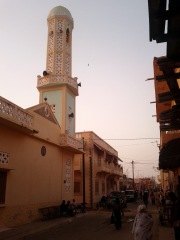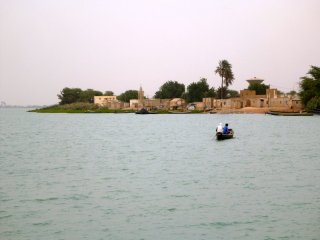Our first morning in Mauritania began with the line of trucks in front of the auberge starting their engines in preparation to cross the border. We finally crawled out of our tent to find a cool fog wrapped around the border post. However, by the time we shovelled down some bread and coffee, packed the bikes, and started rolling the fog was burning off and we found ourselves in a beautiful, classic Sahara landscape. Shallow, sandy canyons, large sweeping dunes, clumps of dune grass, camels, and even occasional trees.
We followed the road away from the border for a few kilometers then at the intersection with the Nouakchott – Nouadhibou road turned left toward Nouakchott. The road here had frequent “auberges” alongside it consisting usually of a handful of small concrete single-room buildings modelled after Mauritanian tents. We didn’t stop at any, but continued to the town of Bou Lanouar where we had lunch at a restaurant in the front room of a house and prooved to be entertaining to the children in the family. Shortly after Bou Lanouar, the roadside auberges, houses, and tents peter out.
About 15 or 20 km after the town we came to a gendarmerie checkpoint. I should note here that the gendarmes in Mauritania are very concerned for the safety of foreign tourists. A couple years ago some tourists were kidnapped along the Nouadhibou-Nouakchott road by AQIM (or someone acting on their behalf) and recently the same has happened in northern Mali. Accordingly, the gendarmes insisted that we must either spend the night in an auberge in a town or camp at one of the checkpoints. At each checkpoint (30 to 100 kms apart) they would check our passports and call ahead to the next one to let them know about when to expect us. Wild camping as we had been doing in Morocco was not an option. However, camping with the gendarmes gave us opportunities to talk to people and access to water. And a couple times we were offered some of the evening’s dinner.
The distance from the checkpoint after Bou Lanouar to the next was too far to make by the end of the day, so even though it was only mid-afternoon we stopped, were directed to a spot behind the checkpoint barracks, and pitched our tents.
About an hour later I was startled by two incredibly loud explosions. After walking around the barracks I was able to see two clouds of smoke billowing up into the sky from several miles away. As I watched, two fireballs erupted from the horizon, rolled up into the sky and turned to black smoke. It took about ten seconds before the thunder clap from these new explosions reached us (I forget what the speed of sound is, you do the math if you want to know how far away they were). Later, the gendarmes told us that it was a training exercise for disposing of land-mines. Apparently very big land-mines.
The next morning the head of the local gendarmes woke us up, concerned that we were letting the day get away from us. The morning was pleasant and quiet and we didn’t rush, but by the time the bikes were packed and we started out the wind was picking up. Instead of a northeast wind, we now had a strong east wind as we rode south east and then south. This proved to be the latest start for the morning wind we experienced. The next few nights were more like this: the evening starts out calm and pleasant and I set my tent up with as much shelter from the east wind as I can find even though it’s only a gentle breeze. Sometime between midnight and 3 AM the wind starts to pick up and by 4 AM it sounds like it’s achieved gale force. It’s like someone is standing next to your tent shaking it as hard as they can with one hand while scooping up handfuls of sand and chucking them through the mesh windows of the tent with the other. So I put on my knit cap, wrap something around my face to keep the sand out of my nose, and pull the sleeping bag over my head. But by this point the tent stakes have pulled out of the soft sand and the rain fly is flapping around like a mad thing. So I pull the ends of the rain fly under the tent itself and try to weight them down with panniers full of water just to keep it quiet until I have to get up. At which point I try to pack up without getting more sand into everything than is already there and without letting the tent fly away. Then it’s time to wrap something around my face again and wobble off on the bike, leaning into the wind and trying to keep the wheels on the pavement. The wind keeps up through mid-day and then gradually lessens as evening approaches and the cycle starts again at the next gendarmes checkpoint.
I actually enjoyed the experience at first, but it started to get old after a couple days. And as we approached Nouakchott the air became more and more dusty until finally we rode into the city under a post-apocalyptic sky, unable to see more than about a hundred meters.
We found a decent auberge (the Auberge Awkar) on the way into town, unpacked, and I took my first shower since Dakhla. Our rest day turned into two days, then three days, then four. This morning we’re heading out again before we become permanent residents.


















































